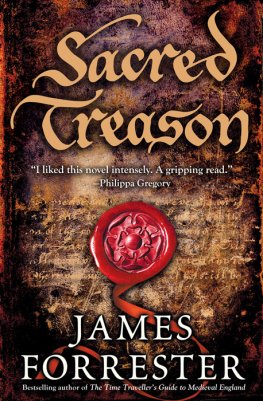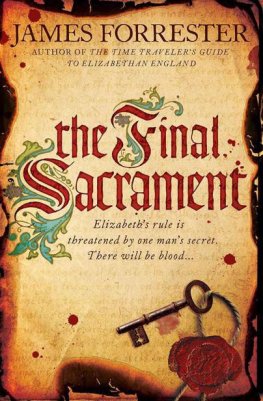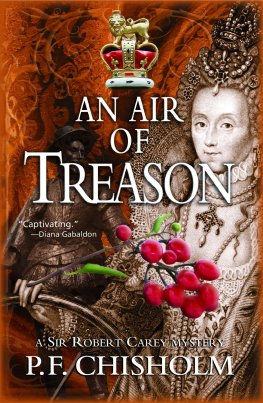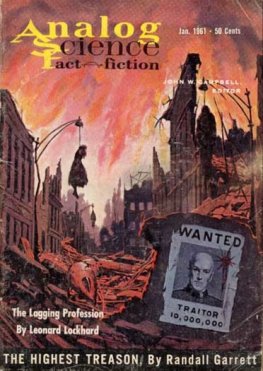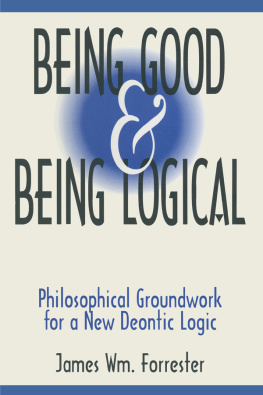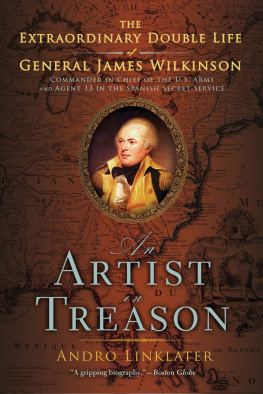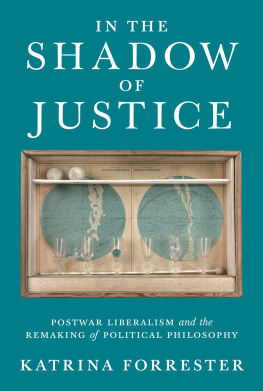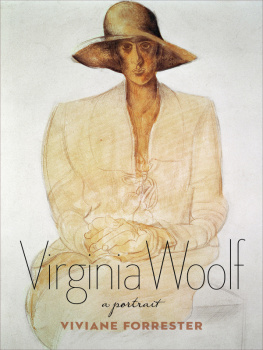James Forrester - Sacred Treason
Here you can read online James Forrester - Sacred Treason full text of the book (entire story) in english for free. Download pdf and epub, get meaning, cover and reviews about this ebook. genre: Detective and thriller. Description of the work, (preface) as well as reviews are available. Best literature library LitArk.com created for fans of good reading and offers a wide selection of genres:
Romance novel
Science fiction
Adventure
Detective
Science
History
Home and family
Prose
Art
Politics
Computer
Non-fiction
Religion
Business
Children
Humor
Choose a favorite category and find really read worthwhile books. Enjoy immersion in the world of imagination, feel the emotions of the characters or learn something new for yourself, make an fascinating discovery.
- Book:Sacred Treason
- Author:
- Genre:
- Rating:5 / 5
- Favourites:Add to favourites
- Your mark:
- 100
- 1
- 2
- 3
- 4
- 5
Sacred Treason: summary, description and annotation
We offer to read an annotation, description, summary or preface (depends on what the author of the book "Sacred Treason" wrote himself). If you haven't found the necessary information about the book — write in the comments, we will try to find it.
Sacred Treason — read online for free the complete book (whole text) full work
Below is the text of the book, divided by pages. System saving the place of the last page read, allows you to conveniently read the book "Sacred Treason" online for free, without having to search again every time where you left off. Put a bookmark, and you can go to the page where you finished reading at any time.
Font size:
Interval:
Bookmark:
James Forrester
Sacred Treason
If a mans faith is his enemy,
There is no refuge anywhere.
Prologue
Tuesday, December 7, 1563
It was a cold day for a killing. The Scotsman, Robert Urquhart, rubbed his hands and breathed on them as he waited in Threadneedle Street, in London. Watching the door to Merchant Taylors Hall, he clutched each finger in turn, trying to keep them supple, his grip strong. He cursed the gray December skies. Only when two men appeared at the top of the steps, walking very slowly and deep in conversation, did he forget the chill in his bones. His victim, William Draper, was the one on the left-the jeweled gold collar gave him away.
He studied Draper. Narrow face, gray hair and beard, about sixty. Not tall but well dressed, in an expensive green velvet doublet with lace ruff and cuffs. Eyes like a fox. He looked selfish, judgemental-even a little bitter. You could see how he had made his money: with an ambition as cold and biting as this weather, and with as little remorse.
Urquhart watched Draper pull his cloak close and wait, standing on the bottom step, above the frozen mud. The man continued talking to his less well dressed companion. The carts and pedestrian traffic of the street passed in front of them, the snorting of the horses and the drivers breath billowing in the cold morning air.
It could not be done here, Urquhart could see that. Not without risking his own arrest. That would be as bad as failure. Worse-for he knew her ladyships identity. They would torture that information out of him. Arrest would simply require her ladyship to send another man, to kill him as well as Draper.
He walked to the end of the street and looked back casually. A servant led a chestnut palfrey around the corner from the yard and held it steady, offering the reins to Draper who mounted from the bottom step with surprising agility. Draper offered some final words to his companion from the saddle, then gestured good-bye with a wave of his hand and moved off.
Westward. He was going home.
Urquhart started forward, walking briskly. He felt for the knife in his belt, the dagger in his shirt sleeve, and the rounded butt of the long-barreled German wheel lock pistol inside the left breast of his doublet. He hoped he would not have to use it. The noise would bring all London running.
He followed his victim to his house in Basinghall Street. Four stories high and three bays wide, with armorial glass in the windows. He waited outside for some minutes then drew a deep breath and slowly exhaled, taking a moment to reflect on his mission.
He climbed the few steps to the door and knocked hard. A bald man in knee-length breeches answered.
God speed you. An urgent message for the master.
The bald man noted the Scottish accent. Another time, sir, you would be right heartily welcome. Alas, today my master has given instructions that he is not to be disturbed.
He will see me. Tell him I come with a message from her ladyship. It is she who bids me seek his help.
Regretfully, sir, I cannot disobey an order-
You are very dutiful, and that is to be commended, but I urge you, look to your Catholic conscience, and quickly. Her ladyships business is a matter of life and death. Tell Mr. Draper I have traveled far to see him in his capacity as Sir Dagonet. He will understand.
The bald man paused, weighing up his visitors appearance and demeanor. He looked at his shoes, dirty with the mud of the street. But the visitor seemed so confident; Mr. Draper might well be angry if he turned away an urgent communication brought by a Scotsman. Wait here, if you please, he said, stepping backward into the shadows.
After several minutes he reappeared. Mr. Draper will see you. This way.
Urquhart followed the servant along a dark passageway, through a high hall, and past a pair of large wooden benches piled with bright silk cushions. He noticed a gilt-framed portrait of the master of the house, and another of a stern-looking man in an old-fashioned breastplate and helmet-Drapers father, perhaps. There was a big tapestry of a town under siege at one end of the hall. Above the fireplace were two brightly painted plaster figures of black women in red skirts, their exotic paganism allowing the plasterer to bare their breasts shamelessly. Here was a whitewashed stone staircase. At the top, a picture of the Virgin. Finally they came to a wide wooden door.
What is your name, sir? asked the bald man over his shoulder.
Thomas Fraser, Urquhart replied.
The servant knocked, lifted the latch, and pushed the door open. Urquhart crossed himself. He loosened his sleeve, felt the hilt of the dagger, and entered boldly.
The room was long, oak-paneled, and warm, and had an elaborate plaster ceiling. Two fireplaces in the far wall were alight, the blazing logs held in place by polished silverheaded firedogs.
The servant turned to his right and bowed. Mr. Draper, this is the Scotch esquire who has come on behalf of her ladyship. His name is Thomas Fraser.
Draper was sitting behind a table at one end of the room, looking down at a piece of paper. Urquhart saw the same narrow face and gray beard he had seen outside the hall. He stepped forward and bowed respectfully. He heard the door shut behind him and the latch fall.
You come from her ladyship? the merchant said softly, looking up. There were tears in his eyes.
Suddenly Urquhart felt nervous, like a boy about to steal silver coins from his masters purse. Why the tears? Was Draper expecting him? But there was just one thing to do and the sooner it was done the better.
Sir, he said, taking another two steps closer, so he was barely six feet from the table. I come with an instruction from her ladyship. He reached for his dagger.
Suddenly a deep north country voice called out from behind him: Hold fast! Move no further!
Urquhart turned. Behind the door as it had opened had been a huge, bearded man dressed in a black doublet and cloak. His hair too was black and curled. In his early thirties, he had obviously seen action on more than one occasion. A livid red mark stretched from above his right eyebrow to his right ear. On his left hip he wore a silver-handled side-sword, and he was holding a pistol.
For one throb of his pulse, Urquhart was motionless. But in that moment he understood what had happened. Her ladyship had been betrayed. He did not know by whom, or how, but it left him in no doubt what he had to do. The instant he saw the scarred man move his pistol hand, he pulled the dagger from his sleeve and hurled it at the mans chest. The next instant he rushed toward him, one hand reaching out to grab the pistol and the other fumbling for the knife at his own belt.
When the gun went off, Urquhart was moving forward. And then, suddenly, he was on his side, the report echoing in his ears.
Only then did he feel the pain. It was as if his scream of agony was a sound formed within the severed nerves of his left thigh. There was a mess of blood and torn flesh. He could see splintered bone. As the sliced nerves and the sight of the shreds of bloody meat combined into a realization of one single, hideous truth, he gasped and raised his head, dizzy with the shock. The rip his dagger had made in the black cloak and shirt revealed a glint of a breastplate. The man was drawing his side-sword.
You are too late, the north country voice declared. Our messenger from Scotland came in the night. Mr. Walsingham knows.
Urquhart screamed again as the pain surged. He thumped the floor, unable to master the feeling. But it was not the wound that mattered-it was the failure. That was worse than the physical hurt. It did not matter that he was a dead man. What mattered was that his victim was still alive.
Font size:
Interval:
Bookmark:
Similar books «Sacred Treason»
Look at similar books to Sacred Treason. We have selected literature similar in name and meaning in the hope of providing readers with more options to find new, interesting, not yet read works.
Discussion, reviews of the book Sacred Treason and just readers' own opinions. Leave your comments, write what you think about the work, its meaning or the main characters. Specify what exactly you liked and what you didn't like, and why you think so.

